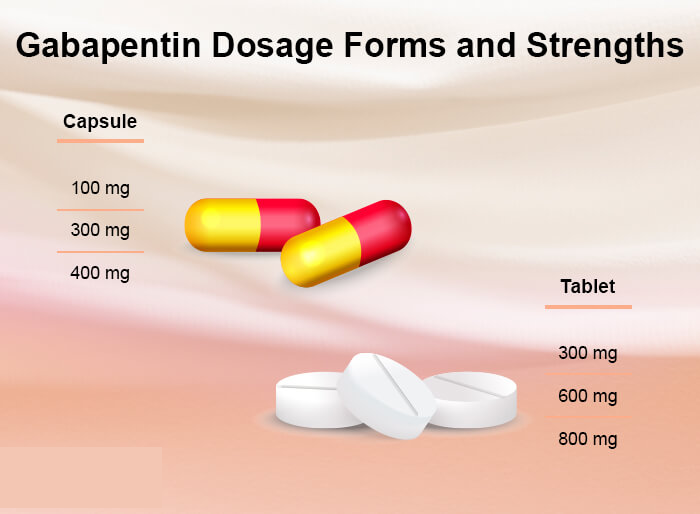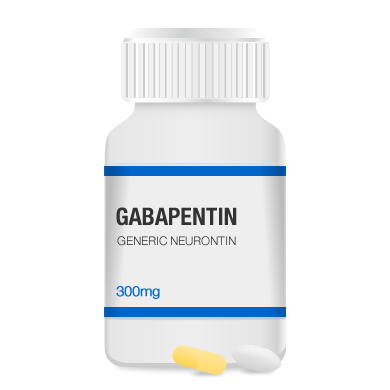Usual Adult Dose for Epilepsy:
Initial dose: 300 mg orally on day one, 300 mg orally twice a day on day two, then 300 mg orally 3 times a day on day three.
Maintenance dose: 900 to 1800 mg orally in 3 divided doses. If necessary, the dose may be increased using 300 mg or 400 mg capsules three times a day up to 1800 mg/day.
Dosages up to 2400 mg/day have been well tolerated in long-term clinical studies. Doses of 3600 mg/day have also been administered to a small number of patients for a relatively short duration, and have been well tolerated. The maximum time between doses in the three times a day schedule should not exceed 12 hours.


The safety and effectiveness of gabapentin available under the trade name Gralise (R) or Horizant (R) in patients with epilepsy has not been studied.
Usual Adult Dose for Postherpetic Neuralgia:
Initial dose: 300 mg orally on day one, 300 mg orally twice a day on day two, then 300 mg orally 3 times a day on day three.
The dose may be titrated up as needed for pain relief to a daily dose of 1800 mg.
Maintenance dose: 900 to 1800 mg orally in 3 divided doses.
Efficacy was demonstrated in clinical studies over a range of 1800 mg/day to 3600 mg/day. However, no additional benefit was demonstrated from the use of doses over 1800 mg/day.
Gabapentin available under the trade name Gralise (R):
Maintenance dose: Gralise (R) should be titrated to 1800 mg orally once daily with the evening meal.
Recommended titration schedule:
Day 1: 300 mg orally with the evening meal
Day 2: 600 mg orally with the evening meal
Days 3 through 6: 900 mg orally with the evening meal
Days 7 through 10: 1200 mg orally with the evening meal
Days 11 through 14: 1500 mg orally with the evening meal
Day 15: 1800 mg orally with the evening meal
Gralise (R) is not interchangeable with other gabapentin products because of differing pharmacokinetic profiles that affect the frequency of administration.
Gabapentin enacarbil extended release tablets available under the trade name Horizant (R):
The recommended dosage is 600 mg orally twice daily. Therapy should be initiated at a dose of 600 mg orally in the morning for 3 days of therapy, then increased to 600 mg twice daily (1,200 mg/day) on day four.
Gabapentin enacarbil extended release tablets available under the trade name Horizant (R) and gabapentin are not interchangeable.
Usual Adult Dose for Restless Legs Syndrome:
Gabapentin enacarbil available under the trade name Horizant (R):
600 mg orally once daily with food at about 5 PM
Usual Pediatric Dose for Epilepsy:
Less than 3 years: Effectiveness has not been established.
Greater than or equal to 3 and less than 12 years:
Starting Dose: ranges from 10 to 15 mg/kg/day in 3 divided doses.
Effective Dose: reached by upward titration over a period of approximately 3 days. The effective dose of gabapentin in patients 5 years of age and older is 25 to 35 mg/kg/day and given in divided doses (three times a day). The effective dose in pediatric patients ages 3 and 4 years is 40 mg/kg/day and given in divided doses (three times a day). Gabapentin may be administered as the oral solution, capsule, or tablet, or using combinations of these formulations. Dosages up to 50 mg/kg/day have been well tolerated in a long term clinical study. The maximum time interval between doses should not exceed 12 hours.
Greater than 12 years:
Initial dose: 300 mg orally on day one, 300 mg orally twice a day on day two, then 300 mg orally 3 times a day on day three.
Maintenance dose: 900 to 1800 mg orally in 3 divided doses. If necessary, the dose may be increased using 300 mg or 400 mg capsules three times a day up to 1800 mg/day. Dosages up to 2400 mg/day have been well tolerated in long term clinical studies. Doses of 3600 mg/day have also been administered to a small number of patients for a relatively short duration, and have been well tolerated. The maximum time between doses in the three times a day schedule should not exceed 12 hours.
What Other Drugs Will Affect Gabapentin?
Taking this medicine with other drugs that make you sleepy can worsen this effect. Ask your doctor before taking gabapentin with a sleeping pill, narcotic pain medicine, muscle relaxer, or medicine for anxiety, depression, or seizures.
Other drugs may interact with gabapentin, including prescription and over-the-counter medicines, vitamins, and herbal products. Tell each of your health care providers about all medicines you use now and any medicine you start or stop using.
Gabapentin Drug Interactions
Although certain medicines should not be used together at all, in other cases two different medicines may be used together even if an interaction might occur. In these cases, your doctor may want to change the dose, or other precautions may be necessary. When you are taking this medicine, it is especially important that your healthcare professional know if you are taking any of the medicines listed below. The following interactions have been selected on the basis of their potential significance and are not necessarily all-inclusive.
Using this medicine with any of the following medicines is usually not recommended, but may be required in some cases. If both medicines are prescribed together, your doctor may change the dose or how often you use one or both of the medicines.
- Acepromazine
- Alfentanil
- Alprazolam
- Amobarbital
- Anileridine
- Aripiprazole
- Asenapine
- Baclofen
- Benperidol
- Benzhydrocodone
- Bromazepam
- Buprenorphine
- Buspirone
- Butabarbital
- Butorphanol
- Calcifediol
- Calcium Oxybate
- Cannabidiol
- Cannabis
- Carbinoxamine
- Carisoprodol
- Carphenazine
- Chloral Hydrate
- Chlordiazepoxide
- Chlorpromazine
- Chlorzoxazone
- Clobazam
- Clonazepam
- Clorazepate
- Clozapine
- Codeine
- Cyclobenzaprine
- Daridorexant
- Dexmedetomidine
- Diacetylmorphine
- Diazepam
- Dichloralphenazone
- Difenoxin
- Dihydrocodeine
- Diphenhydramine
- Diphenoxylate
- Doxylamine
- Droperidol
- Enflurane
- Esketamine
- Estazolam
- Eszopiclone
- Ethchlorvynol
- Ethopropazine
- Ethylmorphine
- Fentanyl
- Flibanserin
- Flunitrazepam
- Fluphenazine
- Flurazepam
- Fluspirilene
- Fospropofol
- Gabapentin Enacarbil
- Halazepam
- Haloperidol
- Halothane
- Hexobarbital
- Hydrocodone
- Hydromorphone
- Hydroxyzine
- Isoflurane
- Ketamine
- Ketazolam
- Ketobemidone
- Lacosamide
- Levocetirizine
- Levorphanol
- Lorazepam
- Loxapine
- Magnesium Oxybate
- Meclizine
- Melperone
- Meperidine
- Mephobarbital
- Meprobamate
- Meptazinol
- Mesoridazine
- Metaxalone
- Methadone
- Methdilazine
- Methocarbamol
- Methohexital
- Methotrimeprazine
- Methylene Blue
- Midazolam
- Molindone
- Moricizine
- Morphine
- Morphine Sulfate Liposome
- Nalbuphine
- Nicomorphine
- Nitrazepam
- Nitrous Oxide
- Olanzapine
- Oliceridine
- Opium
- Opium Alkaloids
- Orlistat
- Orphenadrine
- Oxazepam
- Oxycodone
- Oxymorphone
- Papaveretum
- Paregoric
- Pentazocine
- Pentobarbital
- Perampanel
- Perazine
- Periciazine
- Perphenazine
- Phenobarbital
- Pimozide
- Piperacetazine
- Pipotiazine
- Piritramide
- Potassium Oxybate
- Prazepam
- Pregabalin
- Primidone
- Prochlorperazine
- Promazine
- Promethazine
- Propofol
- Quazepam
- Quetiapine
- Ramelteon
- Remifentanil
- Remimazolam
- Remoxipride
- Ropeginterferon Alfa-2b-njft
- Secobarbital
- Sertindole
- Sodium Oxybate
- Sufentanil
- Sulpiride
- Suvorexant
- Tapentadol
- Temazepam
- Thiethylperazine
- Thiopental
- Thiopropazate
- Thioridazine
- Tilidine
- Tizanidine
- Tolonium Chloride
- Topiramate
- Tramadol
- Triazolam
- Trifluoperazine
- Trifluperidol
- Triflupromazine
- Trimeprazine
- Zaleplon
- Zolpidem
- Zopiclone
- Zotepine
- Zuranolone
Using this medicine with any of the following medicines may cause an increased risk of certain side effects, but using both drugs may be the best treatment for you. If both medicines are prescribed together, your doctor may change the dose or how often you use one or both of the medicines.
- Aluminum Carbonate, Basic
- Aluminum Hydroxide
- Aluminum Phosphate
- Dihydroxyaluminum Aminoacetate
- Dihydroxyaluminum Sodium Carbonate
- Ginkgo
- Magaldrate
- Magnesium Carbonate
- Magnesium Hydroxide
- Magnesium Oxide
- Magnesium Trisilicate
Other Interactions
Certain medicines should not be used at or around the time of eating food or eating certain types of food since interactions may occur. Using alcohol or tobacco with certain medicines may also cause interactions to occur. Discuss with your healthcare professional the use of your medicine with food, alcohol, or tobacco.
Other Medical Problems
The presence of other medical problems may affect the use of this medicine. Make sure you tell your doctor if you have any other medical problems, especially:
- Depression, history of or
- Lung or breathing problems (eg, respiratory depression) or
- Mood or mental changes, history of—Use with caution. May make these conditions worse.
- Kidney disease (eg, patients receiving dialysis)—Use with caution. The effects may be increased because of slower removal of the medicine from the body.